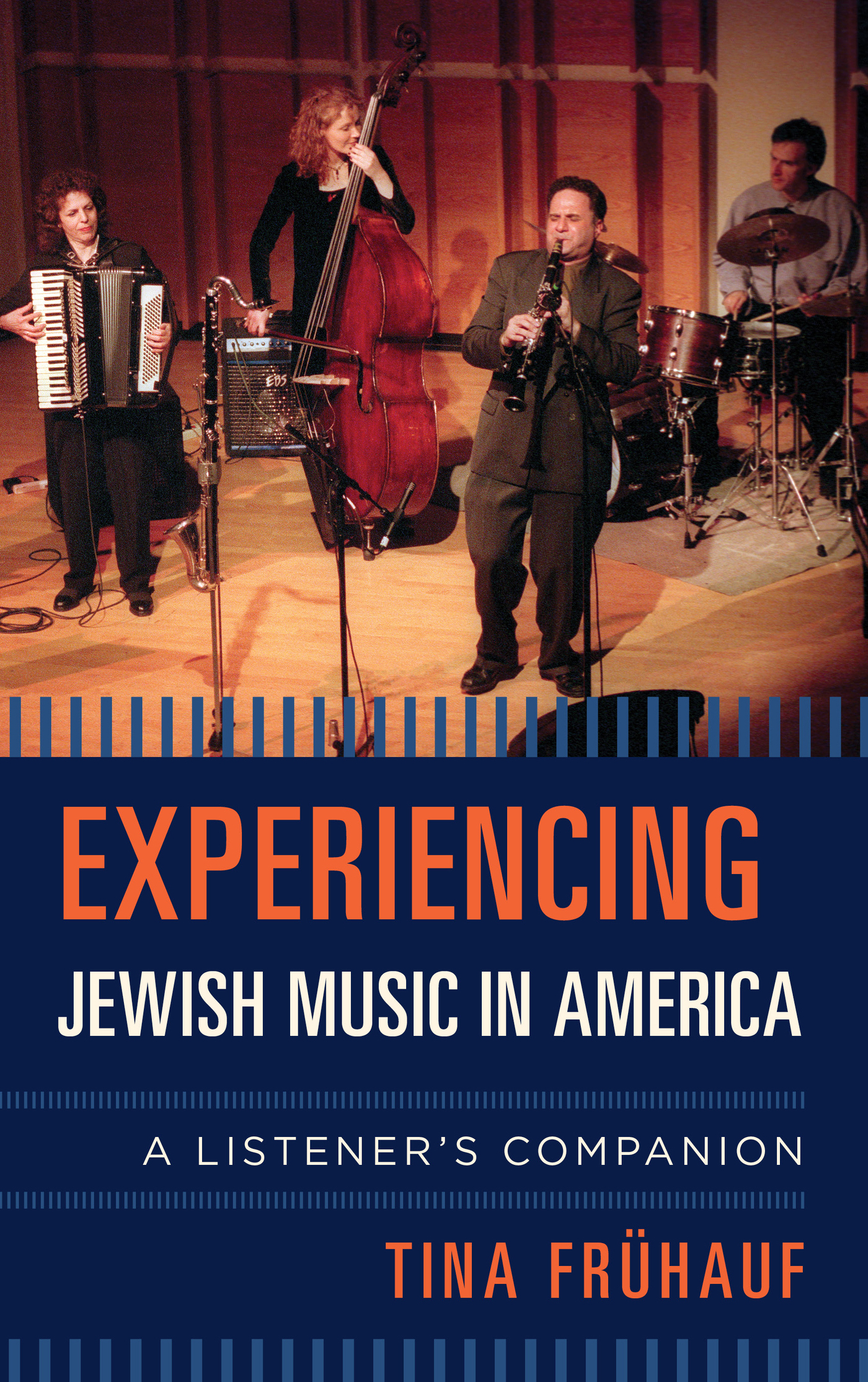Experiencing Jewish Music in America
The Listeners Companion
Kenneth LaFave, Series Editor
Titles in The Listeners Companion provide readers with a deeper understanding of key musical genres and the work of major artists and composers. Aimed at nonspecialists, each volume explains in clear and accessible language how to listen to works from particular artists, composers, and genres. Looking at both the context in which the music first appeared and has since been heard, authors explore with readers the environments in which key musical works were written and performed.
Experiencing Alice Cooper: A Listeners Companion, by Ian Chapman
Experiencing the Beatles: A Listeners Companion, by Brooke Halpin
Experiencing Beethoven: A Listeners Companion, by Geoffrey Block
Experiencing Bessie Smith: A Listeners Companion, by John Clark
Experiencing Big Band Jazz: A Listeners Companion, by Jeff Sultanof
Experiencing Billy Joel: A Listeners Companion, by Thomas MacFarlane
Experiencing Black Sabbath: A Listeners Companion, by Nolan Stolz
Experiencing Broadway Music: A Listeners Companion, by Kathryn Sherrell
Experiencing Carl Maria von Weber: A Listeners Companion, by Joseph E. Morgan
Experiencing Chick Corea: A Listeners Companion, by Monika Herzig
Experiencing Chopin: A Listeners Companion, by Christine Gengaro
Experiencing David Bowie: A Listeners Companion, by Ian Chapman
Experiencing Film Music: A Listeners Companion, by Kenneth LaFave
Experiencing Jazz: A Listeners Companion, by Michael Stephans
Experiencing Jewish Music in America: A Listeners Companion, by Tina Frhauf
Experiencing Led Zeppelin: A Listeners Companion, by Gregg Akkerman
Experiencing Leonard Bernstein: A Listeners Companion, by Kenneth LaFave
Experiencing Mozart: A Listeners Companion, by David Schroeder
Experiencing Ornette Coleman: A Listeners Companion, by Michael Stephans
Experiencing Peter Gabriel: A Listeners Companion, by Durrell Bowman
Experiencing the Rolling Stones: A Listeners Companion, by David Malvinni
Experiencing Rush: A Listeners Companion, by Durrell Bowman
Experiencing Schumann: A Listeners Companion, by Donald Sanders
Experiencing Stravinsky: A Listeners Companion, by Robin Maconie
Experiencing Tchaikovsky: A Listeners Companion, by David Schroeder
Experiencing Verdi: A Listeners Companion, by Donald Sanders
Experiencing the Violin Concerto: A Listeners Companion, by Franco Sciannameo
Experiencing Jewish Music in America
A Listeners Companion
Tina Frhauf
ROWMAN & LITTLEFIELD
Lanham Boulder New York London
Published by Rowman & Littlefield
An imprint of The Rowman & Littlefield Publishing Group, Inc.
4501 Forbes Boulevard, Suite 200, Lanham, Maryland 20706
www.rowman.com
Unit A, Whitacre Mews, 26-34 Stannary Street, London SE11 4AB
Copyright 2018 by Tina Frhauf
All rights reserved. No part of this book may be reproduced in any form or by any electronic or mechanical means, including information storage and retrieval systems, without written permission from the publisher, except by a reviewer who may quote passages in a review.
British Library Cataloguing in Publication Information Available
Library of Congress Cataloging-in-Publication Data
Names: Frhauf, Tina, author.
Title: Experiencing Jewish music in America : a listeners companion / Tina Frhauf.
Description: Lanham : Rowman & Littlefield, [2018] | Series: Listener's companion | Includes bibliographical references and index.
Identifiers: LCCN 2017053148 (print) | LCCN 2017054480 (ebook) | ISBN 9781442258402 (electronic) | ISBN 9781442258396 (cloth : alk. paper)
Subjects: LCSH: JewsUnited StatesMusicHistory and criticism. | MusicUnited StatesHistory and criticism.
Classification: LCC ML3776 (ebook) | LCC ML3776 .F88 2018 (print) | DDC 780.89/924073dc23 LC record available at https://lccn.loc.gov/2017053148
 TM The paper used in this publication meets the minimum requirements of American National Standard for Information Sciences Permanence of Paper for Printed Library Materials, ANSI/NISO Z39.48-1992.
TM The paper used in this publication meets the minimum requirements of American National Standard for Information Sciences Permanence of Paper for Printed Library Materials, ANSI/NISO Z39.48-1992.
Printed in the United States of America
To immigrants of all faiths, cultures, and walks of life
Series Editors Foreword
The goal of the Listeners Companion series is to give readers a deeper understanding of pivotal musical genres and the creative work of its iconic composers and performers. This is accomplished in an inclusive manner that does not necessitate extensive music training or elitist shoulder rubbing. Authors of the series place the reader in specific listening experiences in which the music is examined in its historical and social contexts. By positioning the reader in the real or supposed environment of the musics creation, the author provides for a deeper enjoyment and appreciation of the art form. Series authors, often drawing on their own expertise as both performers, scholars, and audiences, deliver to readers a broad understanding of musical genres and the achievements of artists within those genres as lived listening experiences.
Following in this vein, Tina Frhaufs book provides a deep, informative, thoughtful study of Jewish music in Americaits history, its influences, and its many expressions. Jewish music extends to every conceivable genre, both sacred and secular. Jews, for example, have made up a large percentage of major classical and popular musicians. Violin mastery without international Jewish artists would be unthinkable. Yehudi Menuhin, Fritz Kreisler, Jascha Heifetz, Nathan Milstein, David Oistrakh, and Isaac Stern are but a sampling of the names that made up what critic Virgil Thomson, not without controversy, once called the Jewish fiddle mafia. (He meant it as a compliment.) In the first half of the twentieth century, Jewish songwriters embraced American popular music to such an extent that an old joke went as follows: How do you remember which songwriters are Jewish? Answer: With two words, Cole Porter, the name of the only one who isnt. The punch line ignores Harry Warren and a few other non-Jewish tune
smiths. But not many.
Classical music, pop, and rock hardly exhaust the well of music produced by Jewish musicians, as you are about to find out. From the stage and the screen to arenas and nightclubs, Jewish musicians have vigorously contributed to the musical life of America. And yet, this very range of artistryone is tempted to call it a veritable diaspora of talentgives rise to a vexing question. As Frhauf puts it in her introduction, Given this diversity, how then does one construe the concept of Jewish music? She takes the length of her book to approach that question, which comes down to two different ways of thinking about the concept of Jewish music. One way might be called the positivist and the other the descriptive. The positivist is simply that Jewish music is any music made by Jewish people, while the descriptive requires an explanation of what, for example, makes Jewish liturgical or klezmer music distinctive. We know, for instance, that Fiddler on the Roof contains musical elements traceable to Hasidic music, qualifying it without question as Jewish music. But is Rupert Holmess late 1970s hit Escape (aka The Pina Colada Song) an example of Jewish music because Holmes, whose birth name was David Goldstein, is Jewish? Frhauf weaves a dialectic of seeming opposites to paint a picture that grasps the complexity of her subject.

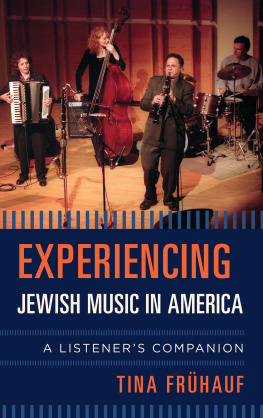
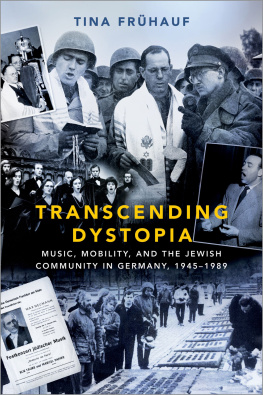
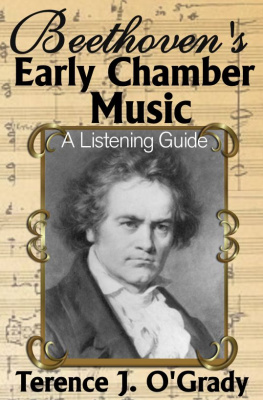
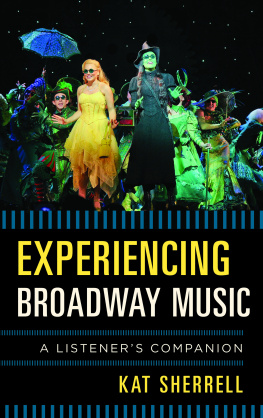
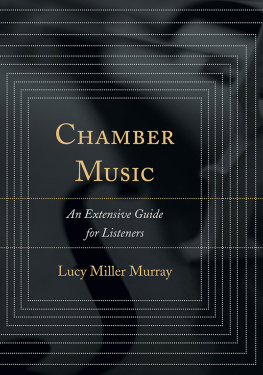
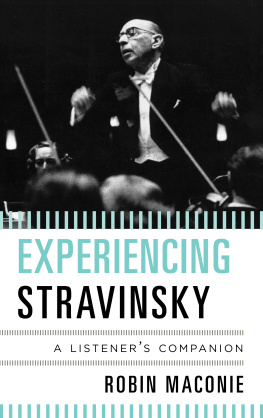
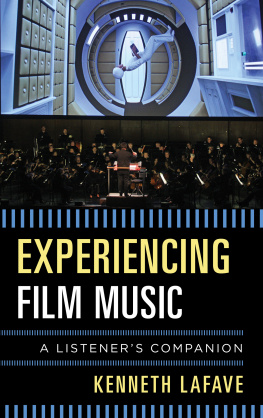
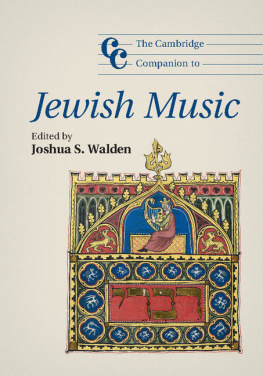
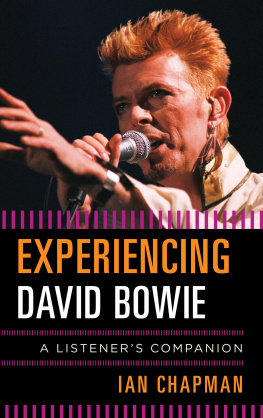

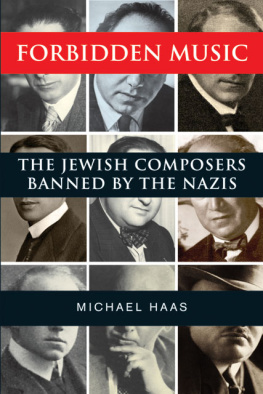
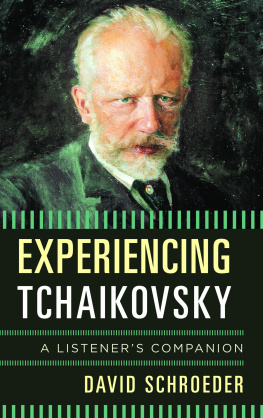
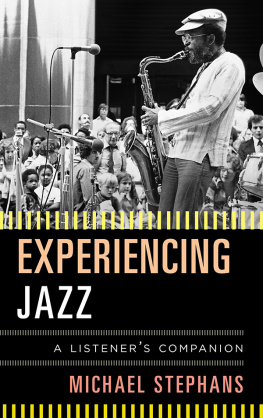
 TM The paper used in this publication meets the minimum requirements of American National Standard for Information Sciences Permanence of Paper for Printed Library Materials, ANSI/NISO Z39.48-1992.
TM The paper used in this publication meets the minimum requirements of American National Standard for Information Sciences Permanence of Paper for Printed Library Materials, ANSI/NISO Z39.48-1992.